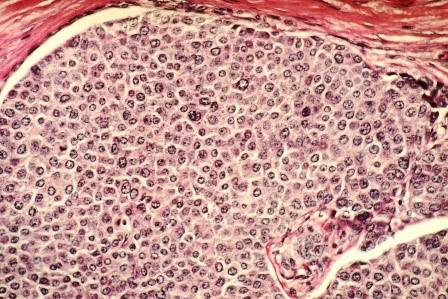
normal tissues and establishes
new centers of growth.
Credit: Dr. Cecil Fox,
National Cancer Institute
An estimated 252,710 new cases of female breast cancer, accounting for 15% of all new cancer cases, occurred in 2017. To better understand proteogenomic abnormalities in breast cancer, the National Cancer Institute (NCI) Clinical Proteomic Tumor Analysis Consortium (CPTAC) announces the release of the cancer proteome confirmatory breast study data. The goal of the study was to comprehensively characterize the proteome and phosphoproteome on approximately 100 prospectively collected breast tumor and adjacent normal tissues. The quantitative mass spectrometry analyses of the confirmatory breast tumor samples further illustrate the proteogenomic landscape of breast cancer as initially describe in Nature. These samples have also undergone genomic characterization. The genomic data will be available from the NCI Genomic Data Commons. The current Proteome Characterization Center, Broad Institute of MIT and Harvard, generated the data with tandem mass tag (TMT) 10-plex quantification. The data released include the raw LC-MS/MS (Level 1 data), along with the peptide-spectrum match (Level 2 data), and protein summary reports (Level 3 data). The CPTAC publication embargo for the cancer proteome confirmatory breast study data ends July 15, 2019. Access the cancer proteome confirmatory breast study datasets on the CPTAC Data Portal.

